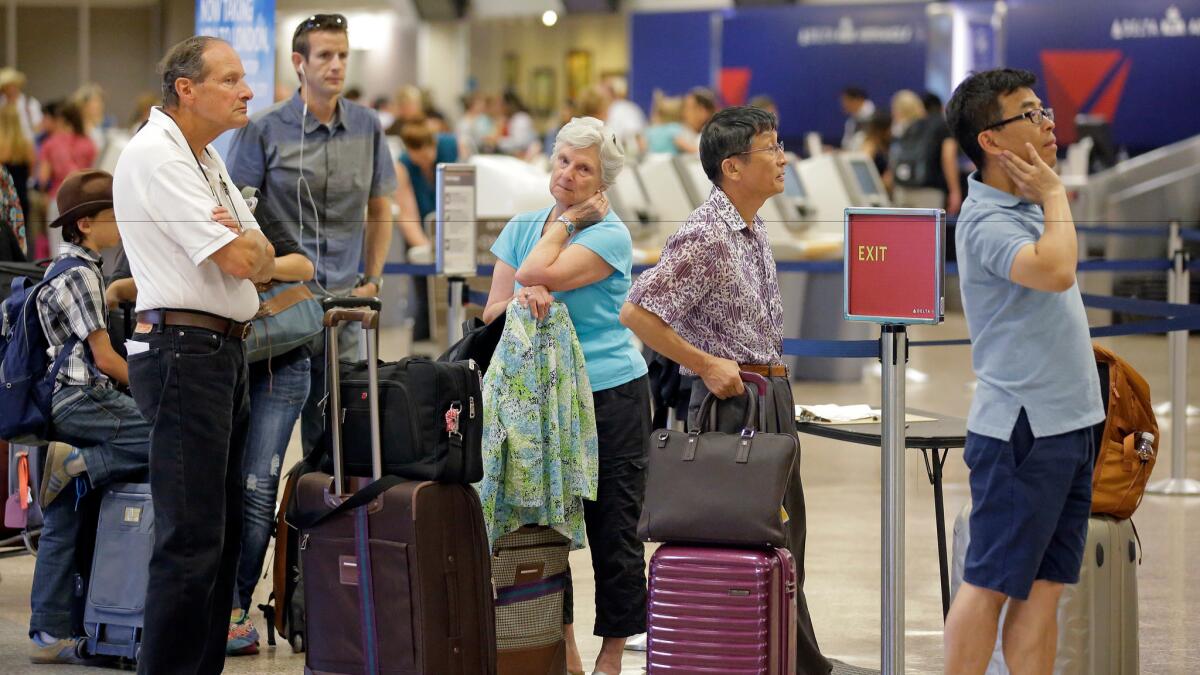Complaints against airlines drop amid fewer delays and lower fares

- Share via
Complaints against airlines dropped 12% in the first half of the year, as carriers delayed or canceled fewer flights and fares declined.
From January to June, the Department of Transportation received 8,376 complaints from fliers about U.S. based airlines, compared with 9,542 in the first six months of 2015.
Representatives for the airline industry attributed the decline in complaints to an increase in profits that U.S. carriers have used to invest in new planes and upgrade lounges over the last few years. Airlines are making more money primarily because of a steep drop in fuel costs.
“Airline customers are benefiting from the investments carriers continue to make — to the tune of $1.5 billion per month — into the products, services and amenities that travelers want when they fly,” said Vaughn Jennings, a spokesman for Airlines for America, the trade group that represents the nation’s biggest airlines.
The complaint numbers will probably grow when future government reports include passenger beefs from July and August, when thousands of flights were cancelled and delayed because of computer problems at Southwest Airlines in July and Delta Air Lines in August.
“I would think they will spike back up again,” said Paul Hudson, president of Flyersrights.org, a nonprofit passenger advocacy group.
Although grievances filed with the federal government may be down, Hudson said his organization continues to get a steady stream of complaints about flight delays, lost baggage and cramped seats.
“We haven’t seen a significant change,” he said.
For the first six months of the year, U.S.-based airlines had an on-time arrival rate of 82%, compared with 77.6% in the first six months of 2015, according to the Department of Transportation. The rate of mishandled bags also dropped, to 2.65 bags for every 1,000 passengers, compared with 3.32 bags for every 1,000 passengers in the first half of 2015.
The rate of passengers bumped off of overbooked planes also dropped in the first six months of the year, to 0.62 for every 10,000 passengers, down from 0.78 for the first half of 2015, according federal data.
Fliers may also have complained less about airlines because airfares have been dropping.
In the first three months of the year, the average domestic airfare charged by U.S. carriers was $361, a 7.8% drop from the same period in 2015. That decline comes after fares dropped nearly 4% from 2015 to 2016,, according to the Bureau of Transportation Statistics.
Industry experts say airlines have been able to keep fares low primarily because one of their biggest expenses — fuel costs — has declined in the last year while demand has remained steady. The cost of a gallon of jet fuel in North America has dropped 13% in the last year.
To read more about the travel and tourism industries, follow @hugomartin on Twitter.
More to Read
Inside the business of entertainment
The Wide Shot brings you news, analysis and insights on everything from streaming wars to production — and what it all means for the future.
You may occasionally receive promotional content from the Los Angeles Times.











